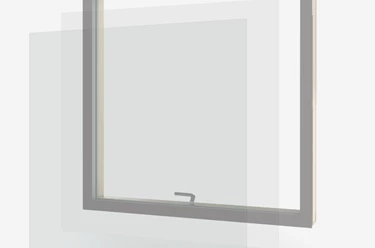
Noise reduction windows and doors
Noise pollution is unwanted or excessive sound that can have deleterious effects on human health. It is commonly generated by industrial facilities but it also comes from highway, railway, and airplane traffic and from outdoor activities. VELFAC glazing are designed to reduce the level of unwanted noise for a better quality of life.
VELFAC glazing are designed to reduce the level of unwanted noise including heavy traffic and other external noise.
Our high performance windows and doors offer excellent insulation which not only reduces heating bills, but also provides impressive noise reduction.
Sound dampening performance in windows is shown by an Rw rating which indicates the number of decibels by which a window can reduce apparent noise. A standard VELFAC double glazed unit achieves Rw32, which can be increased to Rw41 by adjusting the thickness of the glass and the glazing rebate.
While VELFAC windows and doors are very effective at reducing noise, the use of thicker glass or different combinations of glass can significantly improve performance and can deliver more precise acoustic control in location where external noise is high.
Facts
The World Health Organization (WHO) defines noise above 65 decibels as noise pollution. As a consequence, it is recommended to keep noise levels below 65 dB during the day and indicates that restful sleep is possible only if the ambient noise levels are below 30 dB. That's why for some building it is very important to install noise reduction glass. If for example loud traffic noise amounts to 65-70Db, the building must be able to reduce the noise level by 35-40Db.
Need some advice on how to control external noise in your home? Get in touch with your local VELFAC distributor.
Frequently asked questions
How does noise reduction glass work?
When sound waves hit glass, the vibration is absorbed by the glass and is transmitted out of the other side. Every time sound travels through a solid object, some of the vibrations are absorbed into the object and reduced as they pass through, so single pane windows can only absorb a small amount and they will not improve your noise problem.
Double glazing works because there are two panes of glass absorbing the sound vibrations and the gas between the panes also helps to dampen the transmission of soundwaves, creating a sound barrier.
Are triple glazed better than double glazed windows at reducing noise?
Triple glazed windows are best for keeping a room warm or cool, so if you want energy efficient windows, we can combine noise reducing glass, but we wouldn’t recommend triple glazing as an option just for noise reduction. Triple glazed windows do not achieve a considerable difference in sound reduction than standard double glazed windows do. Triple glazing windows are mainly used for increased thermal performance.
Do VELFAC windows provide a noticeable difference in noise reduction?
VELFAC windows and doors are very effective at reducing noise. The use of thicker glass or different combinations of glass can significantly improve performance and can deliver more precise acoustic control.
The Weighted Sound Reduction Index or Rw, is the rating used to measure the level of sound insulating abilities of walls, floors, windows and doors. It is expressed in decibels (dB), and is used for a partition or single component only. The higher the Rw figure, the better the sound isolation that is provided. For example, if a busy street has a noise level of 75dB and the required level of noise in a room is 40dB, the Rw value of the required glass is 35dB. Glass types with a Rw value greater than 35dB can then be offered as solutions.
VELFAC windows can achieve a performance up to Rw41.
What are the best windows for noise reduction?
As glass panes are rigid structures they are ideal for conducting sound waves. For this reason, a single pane of glass in your windows will do very little (if anything) to stop unwanted sounds from entering your home. High quality windows like VELFAC are designed to reduce effectively the noise pollution (eg. heavy traffic) simply adjusting the thickness of the glass and the space between the panes. Learn more about our windows here
